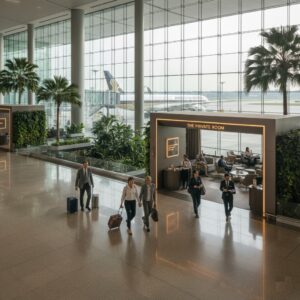Recent safety concerns have led to a notable trend where some air passengers are actively avoiding Boeing-manufactured planes. Issues such as a door panel blowing off an Alaska Airlines plane and reports suggesting lax safety protocols at Boeing have contributed to this apprehension among travelers.
This avoidance is particularly prevalent among individuals who already have a fear of flying, with some passengers going as far as rebooking flights to avoid flying on Boeing jets. The reluctance to board Boeing planes has created a self-imposed “no-fly zone” for certain travelers, impacting both the aircraft manufacturer and the airlines that operate Boeing planes.
Some passengers are opting for airlines that utilize planes from Airbus, Boeing’s main competitor, even if it means facing inconvenience and potentially higher costs. The safety-conscious decisions stem from a heightened awareness of recent incidents involving Boeing planes, including issues like a plane losing a tire upon takeoff, which have fueled concerns and trepidation among travelers.
The fear surrounding Boeing planes has been further exacerbated by federal scrutiny of the safety culture at Boeing and the tragic death of a Boeing whistleblower. This heightened awareness and concern among travelers have led to a significant increase in the use of plane selection filters, indicating a growing trend of passengers prioritizing safety when choosing their flights.
While Boeing declined to comment on these developments, the shift in consumer behavior towards avoiding Boeing planes underscores a broader trend of travelers becoming more informed and safety-conscious in their travel choices.
















More Stories
Poland’s High-Tech Border Revolution: EES Ushers in New Era
Singapore Airlines Soars: Premium Boom Fuels 2026 Travel Surge
Greece Blends History & Flavors: Gastronomy Tourism Revolution